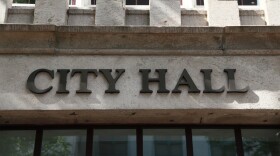Hate incidents on college campuses have been on the rise recently, raising these questions among college and high school students alike: What's free speech? And what's hate speech? What's dissent? What's a threat?
This show originally aired on November 29, 2016.
GUESTS:
- Dave Alcox - History teacher at Milford High School. He received a national award for civics teaching in 2013.
- John Greabe - Professor of Law at UNH.
- Dottie Morris - Chief Officer for Diversity and Multiculturalism at Keene State College.
- Reginald Wilburn - Associate Professor of English at UNH.
New Hampshire has not been immune to a national rise in reported "hate incidents" on college campuses: A swastika was burned into the ceiling of a Keene State College dorm, for example. And just before Thanksgiving, UNH President Mark Huddleston said several students and staff had experienced harassment or threats. At universities and high schools, educators are trying to open more dialogue about what constitutes hate speech, what freedom of expression means with regard to the First Amendment, and how to have thoughtful conversations in the classroom.
SHOW HIGHLIGHTS:
The swastika found recently on the ceiling of a Keene State College dormitory was distressing for everyone, says Dottie Morris.
"What we’re trying to do now is create an environment where we can come together as a community to talk about what types of things we want to have within our community that makes it growth-producing for everyone. Something like this can definitely have an impact on a large percentage of students feeling safe, feeling as though they are part of the community, feeling as though they’re wanted within the community."
As upsetting as some speech or imagery can be, however, says John Greabe, the First Amendment affords strong protection for all kinds of offensive or upsetting speech and limits the ability of public institutions to punish speech or expressive conduct.
"Protected speech can cause great distress," he says. "The First Amendment nonetheless protects that speech from being regulated or punished."
So when does engaging in speech cross the line and actually invade the rights of another and require response from a college or university?
"The problem of course is trying to sort out in those individual cases what’s protected speech and where the line is where someone has gone beyond the line," he says.
"Clearly, the act of burning a swastika onto property, that can be punished, and the fact that it’s motivated by a hateful impulse means that there can be extra punishment."
The First Amendment does not protect threats. "But in order to punish somebody for a threat, that person needs to have intended what he/she said to be a threat," says Greabe. "It’s not enough for the recipient to understand it as a threat. There needs to be a subjective intention to threaten somebody or the First Amendment protects it."
It's a complicated area of the law, Greabe says, and many are dissatisfied with where the lines have been drawn thus far.
For Reginald Wilburn, recent hate incidents on the UNH campus and elsewhere reinforce the importance of the humanities and language studies. He teaches his students that words have consequences.
"For me when we’re talking about the difference between hate speech and free speech, sure, everyone is free to speak whatever they want to speak, in my opinion, but you also have the right to be critiqued, judged, and called out on the language you use."
High school teachers use the so-called Tinker standard of "material disruption" when dealing with free speech or other forms of expression that might be deemed offensive, says Dave Alcox. It's a somewhat different standard than college campuses where adults are involved and the free exchange of ideas is the norm.
The U.S. Supreme Court in Tinker v. Des Moines ruled that students do not “shed their constitutional rights to freedom of speech or expression at the schoolhouse gate.”
New Hampshire schools try to emphasize civics education, Alcox says.
"A lot of it really does come down to civics education," he says "And part of that is civil dialogue and civil discourse... Everybody thinks a little differently but you need to share and recognize what those ideas are. And there needs to be a level of respect of those ideas, but also, certain ideas that our society finds not acceptable or not tolerable -- there needs to be education on why it's not acceptable or tolerable."
Hate speech is anything used to dehumanize/cause harm to a person emotionally/psychologically. It threatens personhood, says Dottie Morris.
— The Exchange (@NHPRExchange) November 30, 2016
.@John_Greabe: no technical def of hate speech, but many cases show govt can punish trespassing/intimidation/harrassment, but line is fuzzy.
— The Exchange (@NHPRExchange) November 30, 2016
Prof. Wilburn @UofNH teaches students that they have a right to speak freely, but also have a right to be called out on language choices.
— The Exchange (@NHPRExchange) November 30, 2016
Milford civics teacher Dave Alcox says there is a diff. btwn "free speech" and "freedom of speech." In HS, Tinker Standard used.
— The Exchange (@NHPRExchange) November 30, 2016
Prof. Wilburn: Free speech does not mean license to dehumanize. #FreeSpeechDebate #hatespeech2016
— The Exchange (@NHPRExchange) November 30, 2016
Dottie Morris says educators and professors are responsible for "teachable moments," not the person who has been harmed.
— The Exchange (@NHPRExchange) November 30, 2016







